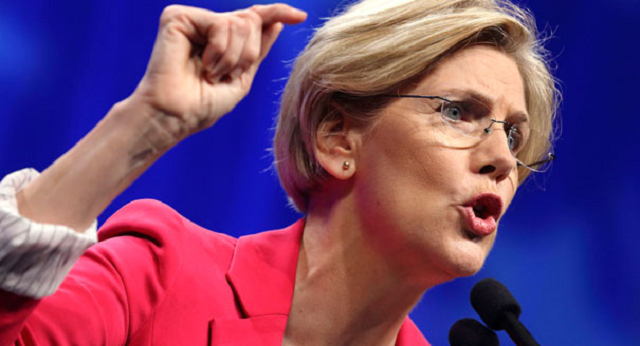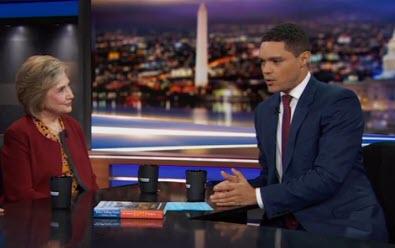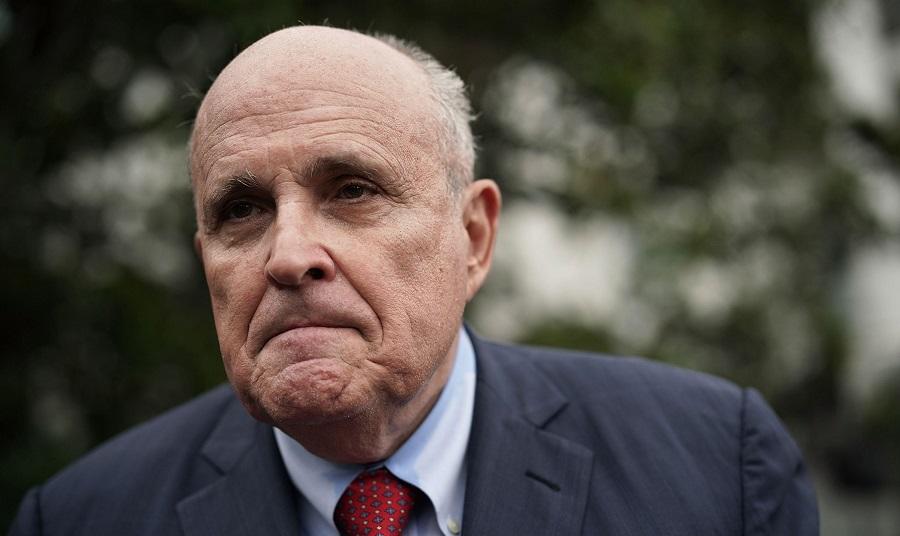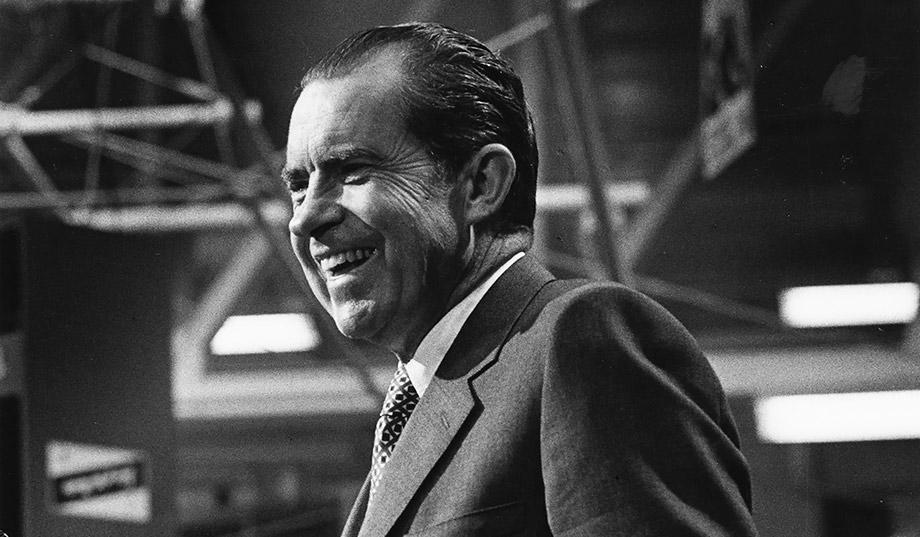On Wednesday, third-tier but recently rising Democratic presidential candidate Rep. Tulsi Gabbard (D–Hawaii) published a Wall Street Journal op-ed under the aspirational headline “I Can Defeat Trump and the Clinton Doctrine.” The piece has re-triggered speculation, most visibly from New York‘s Jonathan Chait, that Gabbard is eyeing a third-party run at the White House.
“What is very clear…is that Gabbard is now working hand in hand with the Republican party,” Chait asserted, citing as evidence of that clarity the congresswoman’s appearances in conservative media and her comparative skepticism about the impeachment inquiry into President Donald Trump (which she nonetheless voted Thursday to support, sending Ann Coulter into a tailspin). “Gabbard’s Journal op-ed today is the clearest sign yet of her future course. There is no line in the piece committing Gabbard to running exclusively in the Democratic primary. It doesn’t even mention the primary.”
Instead, Gabbard writes stuff like: “Whether Mrs. Clinton’s name is on the ballot or not, her foreign policy will be, as many of the Democratic candidates adhere to her doctrine of acting as the world’s police, using the tools of war to overthrow governments we don’t like, wasting taxpayer dollars, costing American lives, causing suffering and destruction abroad, and undermining America’s security.” And also: “Why would Democrats think a Hillary 2.0 candidate would result in anything different?”
Chait deduces that such rhetoric “could…be turned into an argument for Gabbard as a second ‘Democratic’ candidate running against Trump, using a familiar Ralph Nader/Jill Stein case that the Democrats are going to fail, so you should vote instead for the superior alternative to the GOP.”
In fact, the Ralph Nader and Jill Stein arguments, in the 2000 and 2016 elections anyway, were less about their Democratic opponents failing and more about how Al Gore and Hillary Clinton too closely resembled the Republican nominees they had seemed likely to (though ultimately did not) defeat. But that is hardly the only hole in the logic of Chait, or Gabbard, or anyone anxiously fearing or hoping for a Tulsi third-party run.
There are at least three reasons to pump the brakes on the freakout:
1) Post-“spoiler” elections are lethal for non-major candidates.
One of the most common failures of presidential political analysis is to constantly fight the last election, or at least to treat what happened four years ago as the starting line today. Electoral politics are way more dynamic than that, particularly when it comes to third parties and independent candidates.
Take what some people refer to as “spoiler” elections (keeping in mind that almost nobody who has studied the issue seriously concludes that Jill Stein cost Hillary Clinton the 2016 election, even if that common misapprehension hangs over the never-ending Tulsi/Hillary dispute like a fart in an elevator).
Over the past century, there have been four presidential contests in which the third-place finisher received more votes nationwide than the margin between Republican and Democrat nominee—2016, 2000, 1992, and 1968. What happened to those third-place candidates and their political parties four years later? They collapsed.
Nader in 2000 famously received 2.74 percent of the national popular vote, in one of the most razor-thin elections in American history. In 2004, the combined vote of the longtime consumer activist (who ran for president as an independent, though he eventually received the endorsement of the Reform Party) plus Green Party candidate David Cobb was a comparatively miniscule 0.48 percent.
Ross Perot, the protectionist deficit hawk and swaggering CEO, posted the best third-party result in 1992 since Progressive Teddy Roosevelt in 1912—18.91 percent of the popular vote, more than three times the winning margin of Bill Clinton over incumbent George H.W. Bush. Four years later, Perotmania hadn’t quite bitten the dust, but took a haircut down to 8.4 percent.
Segretationist law-and-order candidate George Wallace of the American Independent Party won an impressive five states and 13.53 percent of the national vote in 1968, in a race where the popular-vote margin of clear Electoral College winner Richard Nixon over Democrat Hubert Humphrey was less than a percentage point. In 1972, Wallace returned to the Democratic Party and failed to win the nomination. Meanwhile, his old third party nominated John Schmitz, who ended up with just 1.42 percent of the national vote, far less than Wallace received.
So history, albeit with a small sample size, suggests that support for third-party candidates after perceived spoiler presidential elections tends to plummet. Also, 2016 was the biggest year for non-major candidates in two decades. As I mentioned in January,
spike years in third-party voting tend to be followed by nosedives. The Strom Thurmond/Henry Wallace election of 1948 (5.38 percent for non-majors overall) was followed by 1952’s 0.5 percent. The John Anderson–led 8.14 percent in 1980 dwindled to 0.71 percent in 1984.
High-intensity, high-participation, high-polarization moments are deleterious to the electoral health of non-traditional politicians and parties. On the eve of an already Manichean impeachment process, just about every indicator shows that two-party political polarization is accelerating. Pre-election-year voter interest is at an all-time high, a year after the midterms set records for highest turnout in a century. And those 2018 elections were uncommonly brutal for Libertarians, Greens, and independents.
2) There’s no reason to assume the Green Party nomination is Gabbard’s to lose.
Former Barack Obama 2008 campaign manager David Plouffe, in his controversial October interview with Hillary Clinton, asserted that “one of the reasons [Trump] was able to win is the third party vote.” This theory, while not supported by available evidence, has nonetheless led to all sorts of conspiracy theorizing.
For instance, Clinton in the same interview predicted that Republicans are “also going to do third party again….[T]hey know they can’t win without a third-party candidate, and so I don’t know who it’s going to be, but I will guarantee you they’ll have a vigorous third-party challenge in the key states that they most need it.”
This claim implies that in 2016, a progressive environmental party that had been competing in presidential elections for two decades (including one contest with the same nominee) was either the brainchild or at least the manipulation-target of the GOP, and that Republicans in 2020 are “guaranteed” to organize around a left-bent presidential candidates in critical swing states. (Insert joke about Hillary’s non-campaigning in Wisconsin here.)
Major parties do sporadically find ways to encourage or make common cause on a case-by-case basis with third parties that are perceived to erode an opponent’s support. But such trickeries usually take the form of tweaking behind-the-scenes rules such as ballot-access laws. Only very occasionally do they involve encouraging voters to back non-major candidates.
If Jill Stein was the beneficiary of disproportionate swing-state Republican support, as Clinton is implying here, it did not leave footprints either in campaign finance records or election results. Between 2012 and 2016, Stein’s vote share nationwide increased by 297 percent, from 0.36 percent to 1.07. That’s lower than the 331 percent jump (from 0.99 percent to 3.28) over that same period by two-time Libertarian Party nominee Gary Johnson, who unlike Stein was not promoted in any meaningful way by Russian-backed troll farms. In the swing states that most haunt Clinton’s dreams, Stein’s increases were in line with her national totals—up 219 percent in Pennsylvania, 233 percent in Michigan, and 416 percent in Wisconsin (where Johnson’s increase was 534 percent).
But we still haven’t even gotten to the most bananas thing Clinton said in that interview: “…and that’s assuming Jill Stein will give it up. Which she might not, because she’s also a Russian asset….Yeah, she’s a Russian asset, I mean, totally.” (Side note: That “also” came immediately after Clinton said that Gabbard [who she did not mention by name but confirmed later she was talking about] was “the favorite of the Russians.” So it is very plausible, Clinton-camp denials and fact-checker Pinocchios notwithstanding, that Clinton was suggesting that the congresswoman from Hawaii is also a Russian asset.)
Setting aside what at best is an allegation of useful idiocy and at worst is straight-up McCarthyism, what about Clinton’s analysis of third-party dynamics? They, too, are piss-poor.
For starters: Jill Stein is not running for the Green Party nomination. “Three times is a lot. It’s a lot for any one person and it’s a lot for a party,” Stein told The New York Times 14 months ago. “I would be kind of shocked if it came to that.”
The Green Party’s 2020 nominating season is already well underway, with four debates in the can (including one moderated by Stein), featuring a total of seven declared candidates. Howie Hawkins, the preliminary runaway leader in the fundraising race, has a pedigree sure to be impressive to the 400 party delegates who will select the nominee next July: He co-founded the Green Party and has been a serial candidate for elected office in New York, topping out in big-ticket races at 9.6 percent in a two-way election for Congress in 2004, while losing by as few as 4.2 percentage points in various city contests in Syracuse.
Hawkins, who has a claim on being one of the first developers of the Green New Deal concept, narrowly beat Libertarian Party up-and-comer Larry Sharpe in the 2018 New York gubernatorial race, 1.7 percent to 1.6 percent, despite being massively out-fundraised. He also last month received the Socialist Party’s 2020 nomination for president. And to the extent that some Greens are weary of Stein’s notoriety—consider that even her 2016 running mate, Ajamu Baraka, has opposed the candidate’s lucrative post-election fundraising drive to engineer a swing-state recount—Hawkins is encumbered by no such controversy.
The Green Party is reliably progressive on environmental, economic, military, and social issues. Tulsi Gabbard? A good deal less so. A 2017 polemic from the socialist rabble-rousers at Jacobin contains much of the brief against: “Tulsi Gabbard Is Not Your Friend.” She has an unorthodox history during her brief adult life of being anti-abortion, anti–gay marriage, militantly anti-“radical Islam,” and supportive of nationalists such as Indian Prime Minister Narendra Modi. (See John Stossel’s recent interview of Gabbard for a full airing of the candidate’s views.)
And then there was the most controversial part of Gabbard’s political resume. “Her meeting with Assad? I wouldn’t have done that,” Hawkins said in a July interview, describing Gabbard’s 2015 sit-down with the Syrian dictator “much worse” than what Jane Fonda once did in North Vietnam. Hawkins has also criticized Gabbard for not supporting free college for illegal immigrants, among other not-quite-left-enoughisms.
What about Gabbard’s own interest in running for the Green or any other party’s nomination? She says she has none. On August 29, before the Hillary fracas (and before she announced that she wouldn’t be seeking reelection in the House), Tulsi told CNN flatly, “I’ve ruled that out.” Nothing has publicly changed since then.
Yes, Gabbard could change her mind; yes, Greens could swallow their discomfort about her heterodoxies in exchange for her higher-than-Hawkins name recognition. But even if those two currently unlikely outcomes occur, Gabbard and the Green Party could face the problem of “sore loser” laws, which prevent candidates for a given office from appearing on the ballots of two different parties during the same election cycle.
3) The Democratic field is not a bunch of Hillary 2.0s, foreign policy–wise or otherwise.
Jill Stein, in lashing back at the “McCarthyism” of Hillary Clinton’s “Russian asset” smear, wrote an oddly dated passage in The Guardian:
Confronting the real reasons for Clinton’s loss would open a much-needed conversation about why the Democratic establishment opposes progressive policies that are broadly popular—such as Medicare for All, a Green New Deal, free public higher education, and other programs to improve working people’s lives. They would have to reckon with the unpopularity of their disastrous foreign policy of global military domination.
While I for one may agree about the reckoning part of the disastrous foreign policy (particularly when it comes to the Clinton/Samantha Power–led intervention in Libya, which the 2016 nominee actually described as “smart power at its best“), Stein’s complaints about Democratic domestic policy sound stale in a presidential field that Bernie Sanders has so successfully yanked to the left.
Medicare for All is the explicit position of two of the top three Democratic candidates, and Medicare for All Who Want It is the preference of most of the rest of the field. Rhetorical support for a Green New Deal, along with trillion-dollar plans to combat climate change, is now the Democratic default. Being against free college in the 2020 field is the exception, not the rule.
Al Gore—who was a centrist hawk for almost his entire career through 2000—and Hillary Clinton were both pre-ordained establishment candidates after two-term Democratic presidencies. You can see why progressives would get restive about their respective primaries being uncompetitive—why should we keep voting for the major party if they keep giving us the back of their hands, both in terms of policies and candidates? To an extent that anxious Democrats won’t fully grok until one year from now, 2020 isn’t anything like that.
That includes the main area of Tulsi Gabbard’s selling proposition: What to do (and not to do) with U.S. troops overseas. At the September Democratic presidential debate, five candidates were asked about what to do with U.S. troops in Afghanistan, and all five said to bring them home. (Yes, that includes Joe Biden.) “What seems to be the answer from the foreign policy establishment?” Sen. Elizabeth Warren (D–Mass.) said on MSNBC in January, regarding military presence in Afghanistan and Syria. “Stay forever. That is not a policy. We can’t do that.”
South Bend mayor and war veteran Pete Buttigieg, with whom Gabbard tangled over Syria at the October debate, has repeatedly stressed the need for having Congress authorize all military conflicts, and for such authorizations to contain automatic three-year sunsets. Former congressman Beto O’Rourke has long made similar noises, and both Sen. Cory Booker (D–N.J.) and entrepreneur Andrew Yang have been including the phrase “forever wars” in their stump speeches.
The biggest—really the only—case for there being a “Hillary 2.0” in the race is Joe Biden, who after all is the clear choice for those Democrats nervous about going too far left, has been in national politics for a half-century, served with Clinton in the Obama White House, voted as she did to authorize the Iraq War, and so on. And yet portraying Biden as another Clinton on foreign policy is a mistake.
In her new memoir, the Obama-era human rights honcho and ambassador to the United Nations, Samantha Power, described the 2011 White House deliberations over the Power/Clinton-backed intervention in Libya:
Vice President Biden and Defense Secretary Gates both voiced opposition to any plan that would involve the US military. Biden, who had advocated bombing Bostnian Serb Army heavy weapons back in the 1990s, had grown dubious about using US military force. He regretted having supported the invasion of Iraq and consistently advocated for winding down the war in Afghanistan.
Emphasis mine.
While you can never count on the intervention skepticism and withdrawal preferences of presidential candidates to be translated into White House action (see: the previous four occupants of 1600 Pennsylvania Avenue), you can and should pay attention to the real policy differences between politicians. Biden, unlike Clinton and Power, is “not a big fan of red lines.” And rusty political weather vane that he is, he can’t help but notice that the country and his party’s base are even more weary of war than it was eight years ago, when he tried to prevent U.S. involvement in one.
Tulsi Gabbard has been running against “regime change wars” since the moment she announced her candidacy, and good on her for doing so. Democratic voters, meanwhile, do not seem to be in the mood for encouraging cavalier hawkery this time around among their presidential candidates. Good on them for doing so. Perhaps one of the reasons Gabbard hasn’t climbed above an average of 2 percent in national polls, even after her recent spike, is that she is not surrounded by Hillary-caliber warmongers on the debate stage.
To sum up: If Tulsi Gabbard runs as a Green Party nominee for president and receives even 0.5 percent of the vote, I will wear a “Jonathan Chait Is Always Right” T-shirt the day after the election.
from Latest – Reason.com https://ift.tt/2pASDpF
via IFTTT










